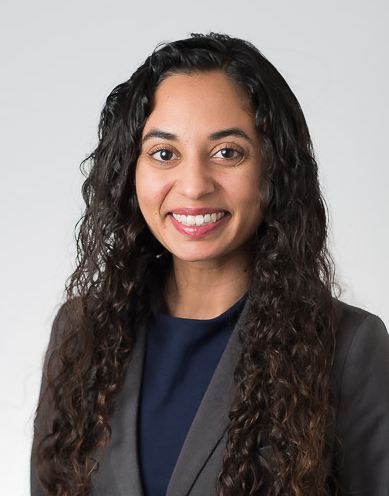Dr. Sri Lekha Tummalapalli is an assistant professor of population health sciences in the Division of Healthcare Delivery Science & Innovation in the Department of Population Health Sciences and an assistant professor of medicine in the Department of Medicine. Dr. Tummalapalli received her MD and MBA from Harvard University. Following a residency in internal medicine at Mount Sinai Hospital, she completed a nephrology fellowship and MAS in clinical research at the University of California, San Francisco. She currently serves on the American Society of Nephrology Quality Committee, and previously the Policy and Advocacy Committee.
Tell us about your background – why did you choose to specialize in nephrology and health services research?

Dr. Sri Lekha Tummalapalli
Kidneys are a fascinating and complex organ. I was drawn to nephrology’s complex physiology throughout medical school and residency. It was only during nephrology fellowship that I fully appreciated the vast burden that kidney disease places on our society. Kidney failure typically takes hold only after decades of damage from other chronic diseases, such as hypertension and diabetes. Yet, care for these chronic diseases is fragmented and there are gaps in care delivery every step of the way. It is going to be the task of the next decade to design systems and incentives to effectively deliver chronic disease care. Patients deserve coordinated, high-quality, patient-centered care that delays disease progression and decreases the risk of cardiovascular events and kidney failure.
Nephrology also fascinated me from a health policy standpoint. Many alternative payment models led by the Centers for Medicare & Medicaid Services were first implemented in dialysis care, including bundled payments, pay-for-performance, and disease-specific accountable care organizations. Our goal now is to shift new models of payment and care delivery to chronic kidney disease (CKD) care, well before the onset of kidney failure, to prevent kidney disease progression and other adverse sequelae.
Tell us about your current research
My research evaluates the effect of health policies and care delivery interventions on quality of care for people with kidney disease. In foundational work, I showed that persons with CKD have had substantial gaps in quality of care that did not improve over the past decade. Awareness of CKD among patients affected is low, and I showed that Medicaid expansion did not improve CKD awareness. These results call for renewed efforts toward CKD early detection and management on the population level.
My ongoing work informs alternative payment model design in kidney disease. First, quality measurement is a key component of payment models, and I along with members of the American Society of Nephrology Quality Committee performed an environmental scan to assess the validity of quality measures related to nephrology. This work informs the selection of measures for existing payment programs, as well as future quality measure development. Secondly, I am assessing the intersection of patient social risk factors with health system quality performance. Adjusting for social risk factors in theory-informed, evidence-based ways will improve the utility and validity of performance measurement. Lastly, I work closely with the Rogosin Institute, an outstanding nephrology provider partnering with WCM and NYP, to implement novel care delivery interventions.
Are there any trends and issues you are following?
An important trend relevant to chronic diseases is the move away from visit-based care and towards proactive population health strategies. Alternative payment models that incentivize quality and cost reduction will continue to proliferate but designing them thoughtfully is hugely challenging. These payment mechanisms rely on quality measurement, but how to effectively measure quality remains elusive.
A second trend is telehealth and remote care. With the COVID-19 pandemic, health systems have rapidly adopted telemedicine and remote monitoring strategies. I believe these will persist if the appropriate payment incentives are in place to support them. Kidney disease lends itself well to remote population health strategies because many parameters we monitor are laboratory based or in other structured data fields, such as medication lists. These can be easily compiled into a CKD registry across a health system, which can then be used to systematically risk stratify and manage patients. Such strategies can achieve equivalent or better outcomes as in-person visits, if coupled with robust care coordination. For example, at-home blood pressure monitoring is more reliable than blood pressure readings in the clinic setting, and antihypertensives can be effectively titrated virtually.
Lastly, a long overdue trend is the greater involvement of patients in research and clinical care. There has recently been an increased emphasis on patient-reported outcome measures and patient activation. In 2019, with the signing of the Advancing American Kidney Health Executive Order, people with kidney disease and clinicians alike were more engaged with nephrology than ever before. It has been a privilege for me to work alongside members of the American Association of Kidney Patients in policy and advocacy efforts, and I look forward to engaging people with kidney disease further in my research.
What brings you to Weill Cornell Medicine?
The Department of Population Health Sciences at Weill Cornell Medicine, led by Dr. Rainu Kaushal, is an innovative department, bringing together health economists, bioinformaticians, epidemiologists, and biostatisticians. This unique environment was the ideal place for me to learn from and collaborate with colleagues in multiple disciplines. Our Division of Healthcare Delivery Science & Innovation, led by Dr. Said Ibrahim, uses a variety of lenses including payment incentives, social determinants of health, and health disparities, to inform healthcare delivery research. I am thrilled also to work with the Division of Nephrology & Hypertension and the Rogosin Institute, an exceptionally innovative nephrology practice, who has been an early adopter of new kidney disease payment models, including ESRD Seamless Care Organizations and upcoming models through CMMI.
- Highlights

